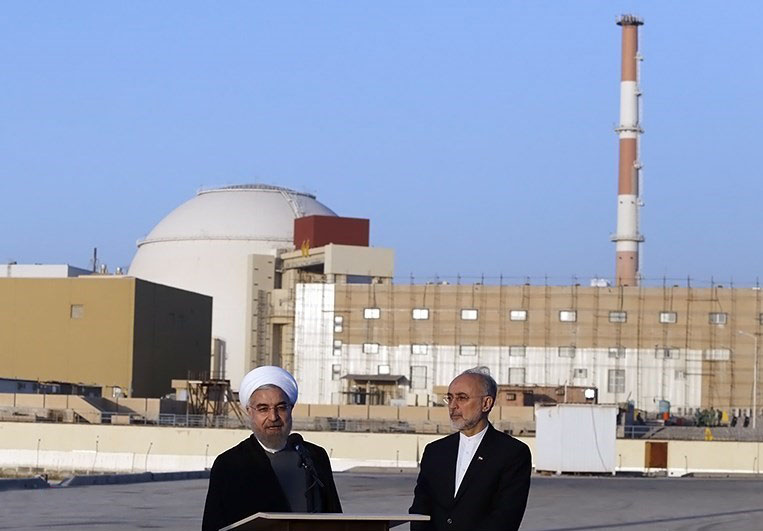Economy
Iran to Restart Fordow Centrifuges as It Rolls Back Nuclear Deal

(Bloomberg) — Iran will begin injecting gas into empty centrifuges at its Fordow research plant from Wednesday, further scaling back its commitment to its nuclear deal with world powers in response to U.S. sanctions.
Officials didn’t say what kind of gas they would be injecting into the centrifuges, which were to stop enriching uranium and be converted for other research under the landmark 2015 accord. If it’s uranium hexafluoride, that would be a serious escalation because it would add to Iran’s stockpile of enriched uranium that has already exceeded caps — but other inert gases can be used for medical and industrial purposes. Fordow has 1,044 centrifuges.
It was the second time in as many days that Iran announced planned retreats from the nuclear agreement, and came after Washington said it would sanction officials reporting to Supreme Leader Ali Khamenei, including his son.
President Hassan Rouhani said the latest steps would be reversed if European nations ensure Iran can sell its oil and reap the economic benefits promised by the international accord that was meant to prevent the Islamic Republic from developing an atomic bomb.
The United Nations nuclear agency will still be allowed to inspect Iran’s activities, Rouhani said, including work at Fordow.
“Iran will continue to maintain and remain committed to behind-the-scenes negotiations,” Rouhani said at a business event in Tehran. “Sanctions should be lifted, Iran should be able to sell its oil with ease and have easy access to its money in banks.”
Scaling back
U.S. President Donald Trump unilaterally left the accord last year and renewed sanctions including the total ban on Iranian oil sales, the country’s economic lifeline.
European signatories say they remain committed to the nuclear accord but have struggled to devise a mechanism that wouldn’t expose European companies to penalties if they trade with the Islamic Republic. The severe economic fallout from the reimposition of sanctions has prompted a surge in tit-for-tat attacks on Gulf oil facilities, drones and shipping traffic that raised fears of a new military conflict in the Middle East.
“This is another measure that Iran intends to use to put pressure on both the Europeans and the U.S. to provide it with some economic relief,” said Ellie Geranmayeh, a senior policy fellow at the European Council on Foreign Relations. “This isn’t Iran secretly inching toward a nuclear bomb scenario — if they wanted to do that, they would’ve completely withdrawn from the agreement and ratcheted up nuclear enrichment levels to 20%.”
Iran began to scale back its compliance in May by exceeding a 300-kilogram (660-pound) cap on the storage of enriched uranium and heavy water imposed by the accord. It then broke the 3.67% limit on uranium purity. On Monday, its nuclear chief Ali Akbar Salehi said it had added a further 30 IR-6 centrifuges, which can enrich uranium 10 times faster than first generation machines.
While officials said Iran had “set aside” limits on uranium enrichment, it has so far held off enriching to anywhere near 20%, the level required for research reactors. Weapons-grade uranium needs to have an enrichment level of 90% or higher. Iran denies its nuclear work is aimed at developing weapons.
-

 OER Magazines2 months ago
OER Magazines2 months agoOER, December 2025
-

 News2 months ago
News2 months agoAI Security Conference 2025 Hosted by Securado Highlights the Changing Cybersecurity Landscape
-

 Insurance1 month ago
Insurance1 month agoSupporting Community Wellness: Liva Insurance Sponsors Muscat Marathon 2026 with Free Health Checkups
-

 Interviews1 month ago
Interviews1 month agoEXCLUSIVE INTERVIEW: TLS Rebranding Marks Strategic Leap Toward Innovation, Sustainability & Growth
-

 Insurance1 month ago
Insurance1 month agoLiva Insurance Supports Community Wellness Through “Experience Oman – Muscat Marathon 2026”
-

 Investment2 weeks ago
Investment2 weeks agoLalan Inaugurates Its First Overseas Manufacturing Facility, Marking Sri Lanka’s First Investment in SOHAR Freezone
-

 Construction3 weeks ago
Construction3 weeks agoInternational Heavy Equipment hosts Open Day at its Refurbished Facility in Sohar Industrial Area
-

 Banking & Finance1 month ago
Banking & Finance1 month agoA New Platform for SME Growth: Oman Arab Bank Unveils Tumouhi





























